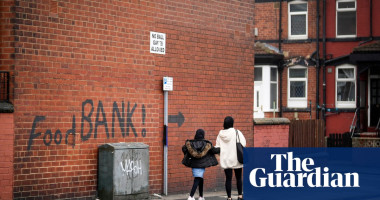Social mobility in UK’s poorest areas ‘falling further behind’
Social disadvantage is now so entrenched in “left behind” areas that a young person growing up poor in parts of London has a significantly better chance of going to university and getting a good job than a child of a similar background from the north-east of England, the UK’s social mobility commissioner has said.
Alun Francis, whose remit is to assess progress in improving social mobility in the UK and to promote social mobility in England, said the “geography of disadvantage” had become increasingly marked in recent years, with deprived northern post-industrial and rural areas and seaside towns falling further behind England’s thriving south-east in terms of economic and social opportunity.
Francis called for “decisive and bold” government action to drive economic growth in left-behind areas and narrow a widening north-south divide, arguing that past attempts to drive social mobility by focusing mainly on educational achievement to drive life chances had failed to shift the dial for many young people.
The report found that working-class teenagers in areas of London with high levels of poverty such as Islington, Hackney and Newham were 19 percentage points more likely to experience upward mobility than contemporaries in similarly deprived places in the north of England such as Sunderland, Hull, Gateshead and Barnsley.
The capital’s superior economic and job opportunities were likely to partly explain these differences, the commission suggested. Ethnicity could also be a factor, with London’s larger immigrant population more likely to see educational attainment as a tool to improve their children’s life chances.
…
In an interview with the Guardian before the Social Mobility Commission’s 2024 State of the Nation report, Francis called for an “honest” assessment of why white British youngsters from the poorest backgrounds consistently under-attained educationally and were less socially mobile compared with their peers.
He said white British people were “at the top of the social mobility tree and the bottom, like bookends”, adding: “We need to ask harder questions about why, and not be constrained by being anxious about what we might find, because if we want to bridge people’s outcomes of life we need to be really honest, to find a better answer.”
Francis, who is principal of Blackpool and the Fylde further education college, said while white British children on free school meals persistently underperformed at school, children with a Chinese background on free school meals outperformed the national average for non-free school meal children at ages 11 and 16.
It was important to avoid “simplistic and misleading” accounts that assumed social mobility was getting worse on all counts, he said. Poverty was not the only determinant of life chances, he added: “What are the things that enable some people to do well despite their circumstances, where others really do not?”
Asked whether there was a link between the August riots and deprivation in many of the communities where disorder took place, Francis acknowledged many of those towns had been ignored in terms of economic opportunity, saying: “In those areas we certainly created a climate where people do feel left behind.”
He added: “I would say in those areas the vast majority of people in straitened circumstances feel frustrated, a bit defeated, sometimes a bit sad, but I don’t think they always go on to the streets and become violent about it.”
